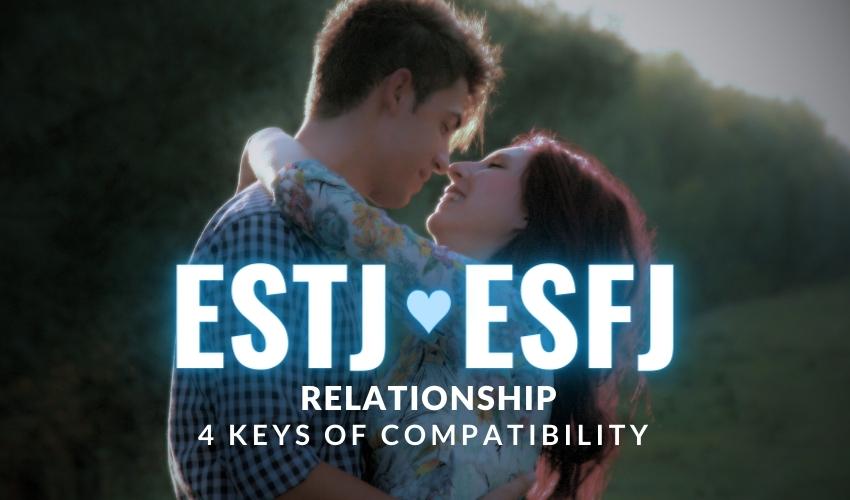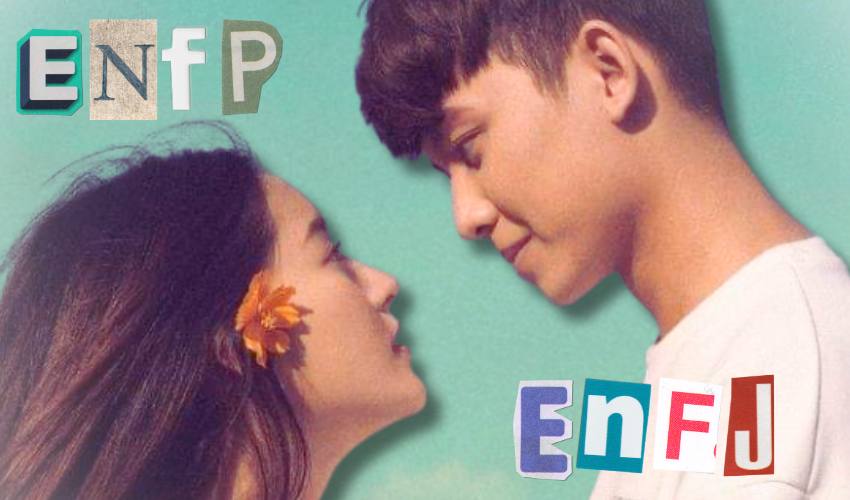With Valentine’s day just around the corner, now may be a great time to confess your undying love for someone you’re with or want to be with. Valentine’s Day is an especially opportune occasion for people who want to confront their crush. Here is a look at what each Myers-Briggs type is likely to do when they are crazy in love with someone.
INFJ
Less mature INFJs who have not yet adequately developed their Fe for whatever reason may have a much stronger fear of getting hurt or rejected. As introverts, they may sometimes withdraw from their extraverted function and get stuck in a Ni/Ti loop of over analyzing a situation and fixating on what could go wrong. From afar, INFJs have a propensity for idealizing the object of their enamorment only to be disappointed by the truth. INFJs may initially try to mask their feelings and feel the person out first so as not to embarrass themselves. They’ll engage them and try to connect or do thoughtful things in the hopes that the other person will get the hint. Sometimes INFJs procrastinate and wait too long to make their move. By the time they feel prepared enough to take action, the other person is already beyond reach.
INFP
Sometimes for INFPs, just imagining being with their romantic crush is satisfying enough to dissuade them from undergoing the risk of making the dream a reality. They may have a tendency to form an unrealistic overly idealized image of a person that can set them up for disappointment. INFPs will try to know everything they can about their crush through whatever means including from people in some way connected to them. Working up the courage to share their feelings can be really hard and they will try to befriend the person first. Their strategy is to be like a loveable tapeworm that burrows themselves deep in that person’s life to feel intimately close to them. Then, with love and charm, they can possibly build a romantic bond that blossoms into something more.
INTJ
Similar to INFJs, INTJs may fall into the trap of over analyzing the prospects of a person without ever acting on their desires. Romantic windows of opportunity may pass them by because they spent too much time thinking about it. They may also be overly protective of their feelings fearing the embarrassment of bearing their soul and subjecting themselves to the risk of romantic rejection. INTJs may be inclined to deny the extent of their feelings even when they are desperately in love. INTJs are human like everyone else but they don’t like giving people power over their emotions. INTJs desire companionship but often place too high a standard or expectation for most people to live up to.
INTP
Like the INFP, INTPs can easily ruminate on the possibilities of being with someone without ever acting it out. When INTPs crush on someone, they may try to place themselves strategically in the right place for something to happen. INTPs may become borderline stalkerish in an attempt to maximize the opportunities for interaction with that special someone they have designs on. It’s hard for INTPs to just come out with their feelings. They look for an “in”, a point of common interest to justify initiating a conversation. They will try to impress them with their knowledge and wit in the hopes that their crush will organically discover how interesting, amusing and loveable INTP can be. On the other hand, INTPs may also spend too much time on the fence trying to gauge when the “best” time to make their move until the train finally leaves the station without them.
ENFJ
The ENFJ crowd tends to have little trouble with making their affinity for people known to them. They are naturally friendly and even with a potential love interest they may pursue a relationship with their characteristic charm and engaging wit. When they are intensely admiring someone, they may struggle to contain their enthusiasm and may be unable to behave normally around them. This may cause them to step back and second guess themselves and their ability to close the deal or face the potential of having their heart crushed by their crush. They may worry too much about being judged and may try to do all the right things to win their Valentine’s heart.
ENFP
ENFPs are flirty by nature and they love social interplay that has some romantic tension involved. When they have a crush on someone however, the stakes get elevated and suddenly their big hearts and emotional wellbeing become at risk. Their optimistic outlook allows them to overcome trepidation and put their feelings out there. They may feel anxiety and lots of butterflies in their belly, but the risk of rejection is not enough to stop their positive mindset. ENFPs can be prone to idealizing people, which can influence how a crush develops; they can feel conflicted about how to proceed once reality sets in and the grass starts to appear greener elsewhere.
ENTJ
If ENTJs feel blindsided by the feelings in some way, they may need more time to get in touch with Ni/Fi and figure out what they really want. ENTJs tend to decide things based on probable consequences, so they would pursue a crush if they felt that the long term prospects were very certain and compatible with the rest of their goals/objectives in life. Since ENTJs tend to take a long term view of relationships, they will carefully look for any factor that could indicate a dead end or undesirable outcome. If they decide it is worth the risk, they will quickly form a plan and carry it out. Some ENTJs are more stubborn and don’t like to give up too easily, while others can be quite ruthless with themselves in eliminating their “useless” feelings and moving on.
ENTP
Immature ENTPs might resist crushes because, unconsciously, they do not like to feel controlled or restricted by outside forces or their own emotions. Since ENTPs are so responsive to the external world, they are not always in touch with their own inner world. They lack Fi and their self-reflective function is in the inferior position, so it might take them longer than other types to commit to action. ENTPs are natural explorers who like to meet new people and generally get intrigued by anyone who has interesting ideas or is capable of carrying on intelligent conversations. Since they are open to many possibilities, they might simply choose to maintain a wait-and-see attitude and allow things to develop naturally until they feel more resolute about the person.
ISTJ
When ISTJ encounter their crush, they may shut down emotionally. They may become inexpressive and behave awkwardly in their presence. It may take them an extra amount of time to work up the fortitude to try and go for it. They have difficulty acting naturally in spontaneous situations and they will probably try to rehearse and plan what they will say and how they should say it. ISTJs will try to ease their way in slowly and gradually by trying to build a rapport by helping them in some loving way.
ESTJ
ESTJs may struggle with matters of the heart. Their inferior introverted feeling may make them feel a bit lost when deciding how to go about approaching their crush. They may ultimately resign themselves in an uncharacteristically passive way, to waiting for the other person to make their move first with maybe a little encouragement from them. ESTJs are surprisingly sensitive to the prospect of being in an emotionally vulnerable situation and appearing desperate. They may defer to the universe and may determine whether it is “meant to be” if the other person makes the first move and “passes the test”, or they may alternatively convince themselves that the other person is not interested or unworthy if no action is taken.
ISFJ
ISFJs proceed cautiously before approaching a romantic crush. They are normally self sufficient and independent individuals but when they fall into the grip of lust of extreme infatuation with someone else they may lose touch with their sense of inner stability. In an attempt to regain a sense of control over their situation, they may become obsessed with knowing as much about the other person as possible. They’ll gather all sorts of tiny details as a means of assuaging their own anxieties. ISFJs may lose their senses and focus all their attention on that person at the expense to their own needs and priorities.
ESFJ
Because ESFJs are so outwardly focused, they tend to lack insight into their own inner workings including the recognition that they are crushing on someone. ESFJs may also develop a crush on someone as a result of hearing that they were interested in them first although ESFJ may never have held any interest in them prior to. ESFJs are generally attuned to social status and have a keen underlying sense of who holds more authority or power in situations. Thus, ESFJs who feel as though they have the upper hand in some form or other will likely be more forward/bold about their feelings. Conversely, if they feel the other person is out of their league then they will do their utmost to keep their feelings hidden or repressed due to lack of confidence or fear of rejection.
ISTP
Since ISTPs are a bit out of touch with their own emotional undercurrents, they may not know exactly how to proceed when they experience especially strong feelings for someone. They may dither and equivocate trying to decide if pursuing this crush is really worth the risk or energy. They study the object of their interest intently to learn more about them from a safe distance. When in the presence of their crush, they may have a difficult time concealing the nervous energy bubbling out of them and may become uncharacteristically enthusiastic and excitable.
ESTP
ESTPs have little reservations about going after their crush. They enjoy the thrill of the chase and they generally pursue it with confidence and fun. They usually are less concerned or held back by the fear of failure or disappointment but if their feelings become deeply invested, they may become defensive and fearful about rejection. ESTPs may worry that emotional vulnerability may ruin their sense of fun and ease. ESTPs treat the process of wooing and courtship as a game of strategy where they try to gain mastery over other’s emotions so that they can push all the right buttons to get the responses they want.
ISFP
ISFPs generally enjoy the excitement of a crush. However, they are not usually prone to taking action and prefer to nurture their feelings quietly at first. Less mature ISFPs can be completely at the mercy of whatever they feel in the moment. Those who rely more on Fi/Ni can be shy and hesitant about pursuing love crushes because they have a greater underlying anxiety about being disruptive to other people’s lives or because they lack confidence or fear rejection. They can be quite passive, waiting to be pressed into situations rather than initiating anything. This can make them difficult to read because their feelings ebb and flow, which may result in too many mixed signals. ISFPs do not usually plan things in advance or know whether they will make a move beforehand; they prefer to feel out every moment and take things as they come.
ESFP
ESFP’s introverted feeling will compel them to protect their own feelings, making them hold back from pursuing a crush immediately. On one hand, Se enjoys the dramatic flood of emotions that Fi brings. On the other hand, Fi can be full of trepidation because of an underlying fear of being exposed, humiliated, or rejected, especially because ESFPs are generally well-liked and confident in front of others. In a way, this natural aplomb can amplify their insecurities because romantic feelings are a high stakes endeavor. They may even unconsciously resist a crush because they do not like the feeling of ceding control of their inner emotions to others. If they are not sure whether the person will reciprocate, any visible “sign” from them can be a source of emotional turmoil, pushing them in and out of the conflict between their Se love of excitement and their Fi need to protect emotions.
related posts:
- How Each Myers-Briggs Type Dresses
- How Each Myers-Briggs Type Would Become Famous
- What Each Myers-Briggs Type Is Like During Childhood
- What Each Myers-Briggs Type Is Smug About
- How Each Myers-Briggs Type Reacts To Authority
- INTJ Relationships (With Each Myers Briggs Type)
- INFJ Relationships With Each Myers Briggs Type
- 6 Reasons Why INFJ and ENTP Belong Together
- 6 Reasons Why INTJ and INFJ Fall In Love
- 6 Reasons Why INTJs Love ENFPs
- How INFJs Show Love – 7 Signs An INFJ Likes You
- http://mbti-notes.tumblr.com/post/130430997707/masterpost-mbti-crushes
- ISFJ and ISTJ in love: 5 Essential Dynamics of their Relationship - February 24, 2024
- ENTP and ENTJ in love: 6 Critical Dynamics of Their Relationship. - February 18, 2024
- ESTJ and ESFJ in love: 4 Key Aspects of their Relationship. - February 12, 2024






ESTJ is on point! I’m shocked